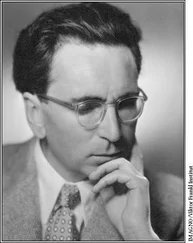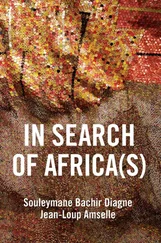1 ...8 9 10 12 13 14 ...27 As he walked along the ample footpaths of Princeton University on his way to visit the chairman of his department, Bacon had no idea that what he was about to do would have a decisive effect on his future. The ash trees that lined the walkways were as immobile as the columns of a temple whose roof was slowly chipping away with age. A sharp wind blurred the edges of the buildings that housed the different academic departments. The faux-medieval style of the architecture—copied directly from Cambridge and Oxford—looked even less authentic than usual in the bright sunlight. Prisoners in their uncomfortable gray suits, professors and students sought refuge inside the anachronistic buildings, escaping from the frigid air that sent their hats flying off their heads. Bacon knew the dean had summoned him to tell him something quite important, but for some reason he wasn’t nervous at all. He trusted that the path of modern science would carry him to the best possible place in the world. And anyway—this was the best part of all—he had finally made a rather big life decision, thanks to a certain telephone call he had received two days earlier from the Institute for Advanced Study.
The new dean was a short, loquacious little man who quickly ushered Bacon into his office. Seated behind a great desk that obscured a good half of his chest, the man couldn’t seem to stop fidgeting with his salt-and-pepper beard, as if trying to untangle the threads of destiny. He offered an outstretched hand to Bacon and invited him to have a seat. He then removed a folder among the many piled high upon his desk and, without looking twice at Bacon, began to read from its contents.
“Francis Bacon … of course. How could I forget a name like that? Let’s see … summa cum laude … ‘Excellent student, detailed analyses, slow at decision-making but an extraordinary theorist … In short, one of the most talented students of his generation.’ So, what do you make of all this?” he asked, in a voice which reminded Bacon of the whistle of a child’s toy locomotive. “There is nothing but praise here for you, my boy! Remarkable, truly remarkable.”
Bacon barely heard what the dean was saying; he was too busy eyeing the collection of German physics journals— Annalen der Physik, Zeitschrift für Physik, Naturwissenschaften —that lined the bookcases of the tiny office. Apart from the magazines, little glass cases and flasks were the predominant decor of this office, which seemed more like an entomologist’s laboratory than a physicist’s administrative office. Amid the disarray, Bacon spied a photograph of the dean standing next to Einstein. In the photo, the dean stood proudly beside the discoverer of relativity like a squirrel waiting anxiously to climb a sequoia tree.
“I’m very flattered, Professor.”
“I want you to know that this is not my opinion that I am sharing with you here; I am merely reading from your academic file. I would have liked to have known you better, but I guess that wasn’t meant to be, and so I can’t praise you quite as well as some of my colleagues can. Nothing to be done about that. Now, if you don’t mind, I’d like to get to the point. I have called you here today to tell you something that you probably know better than I do.”
“I think I know what you’re about to tell me, Professor.”
“Following the recommendation of Professor Oswald Veblen, the Institute for Advanced Study has invited you to join their team.” Bacon couldn’t help cracking a smile. “Of course, we would prefer that you would remain here with us, but you have the final say in the matter. If you’d like to go off and join our neighbors, I can’t tell you not to. But I have to warn you that at the institute you will only be eligible for the title ‘assistant,’ and not ‘doctoral candidate.’ You are aware of what that means, aren’t you? Do you think, perhaps, you’d like to give it some more thought, or have you already made up your mind?”
In the beginning, the institute’s offices were housed in Find Hall, in Princeton’s mathematics department, while the money was raised to build a proper home for the organization. From 1939 on, its main offices were located in Fuld Hall, a giant red-brick box that actually looked more like a mental institution or a government building of some sort. The new headquarters allowed the institute to distance itself a bit from the university, although there was still a bit of bad blood between the two institutions. When the institute was just getting started, its director, Abraham Flexner, had promised not to invite Princeton professors to join its ranks, but Oswald Veblen and the Hungarian mathematician John von Neumann, both originally at Princeton, ultimately decided to sign on at the institute.
“I’m planning to accept the institute’s offer, Professor.”
“That’s what I thought,” said the dean.
Bacon had already carefully weighed the advantages and disadvantages of the offers he had received. He knew that at the institute he would not be granted the title of doctoral student, but he also knew that there he would have access to some of the greatest physicists and mathematicians in the world. He didn’t doubt his decision for a second.
“Very well,” said the dean. “Then I suppose there’s nothing left to say. How old are you, my boy?”
“Twenty.”
“You’re still so young … too young. Perhaps you’ll still be able to set things right sometime in the future. But don’t waste time; the early years are essential for physicists. It’s one of those unwritten rules, unfair as they may be, but you must know it by heart: After turning thirty, a physicist is through. Through. I’m telling you this from experience.”
“Thank you for your advice, sir.”
His appointment with Professor Von Neumann, on Tuesday at three in the afternoon, flashed through Bacon’s mind, but the dean quickly interrupted his reverie:
“All right, then, get out of here.”
HYPOTHESIS II: On Von Neumann and the War
“My name is Bacon, Professor. Francis Bacon.”
Frank had arrived at the institute at the agreed-upon hour. He had put on one of his best suits, rat-gray, and a tie with a pattern that looked like little giraffes.
“Oh, yes, Bacon. Born January 22, 1561, at York House. Died 1626. A lunatic, unfortunately. But, oh, yes, what a fertile mind. Did you know I could recite the entire Novum Organum for you, line by line, right now if I wanted? But I suppose that would be rather boring for you. Anyway, I have another appointment that I don’t want to be too late for.”
Of all the men of modern science, nobody seemed able to warm up to the cunning, turbulent nature of numbers quite as John von Neumann had. As a young scholar at Princeton, where he spent a few months as a professor of mathematics, he had acquired a reputation for being one of the most intelligent men in the entire world—and, at the same time, one of the worst professors imaginable. His name in Germany was Johannes, a transliteration of the original Hungarian Janós, and so he had little apprehension about translating it into English in order to adapt to the more casual way of his adopted country. Born in Budapest in 1903, he became Johnny von Neumann in the United States, which made him an odd mix of Scotch whisky and Czech beer. He was now only thirty-seven, but his career as a child prodigy had catapulted him early on into the pantheon of contemporary mathematics. For the past few months, he was also the youngest member of the Institute for Advanced Study. Bacon had never taken any of his courses, but the Princeton campus was rife with tales of the professor’s many eccentricities, and Bacon was familiar with all of them. As he would soon hear for himself, Von Neumann had a peculiar accent that was not precisely the result of his Central European provenance—in fact, many people said he had simply invented it himself. He always wore the same uniform, a neat, coffee-colored suit that he never varied, not even during the summer or for excursions into the nearby countryside. In addition to his gift for rapid-fire mathematical calculations, he also had a photographic memory: After merely scanning a page of text or quickly reading through a novel he could recite it by heart, from start to finish without committing a single error. He had done this several times with A Tale of Two Cities.
Читать дальше












